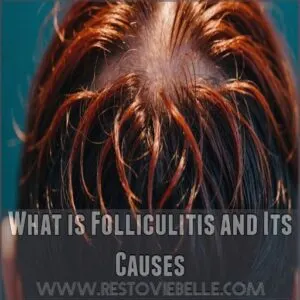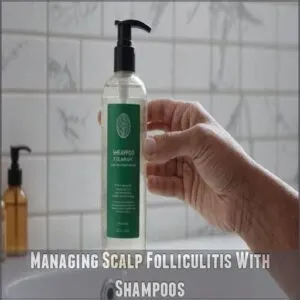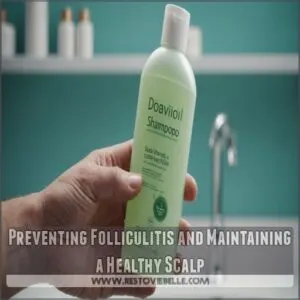This site is supported by our readers. We may earn a commission, at no cost to you, if you purchase through links.
 Folliculitis giving you grief? Finding the best shampoo for folliculitis can make a world of difference.
Folliculitis giving you grief? Finding the best shampoo for folliculitis can make a world of difference.
Consider a tea tree shampoo for its deep-cleaning and antifungal properties. Neutrogena’s T Gel is also a classic choice, known for tackling both irritation and inflammation. If you prefer a mild option, the fragrance-free sensitive skin shampoo is a hit with many.
These shampoos work wonders when used regularly, promoting a healthy scalp environment.
Remember, though, following up with a moisturizing conditioner can enhance results. Ready to have your scalp feeling fabulous? Stay tuned for pro tips to boost your hair care routine!
Table Of Contents
- Key Takeaways
- What is Folliculitis and Its Causes
- 9 Best Shampoos for Folliculitis
- 1. Tea Tree Shampoo Deep Cleanse Oily Hair
- 2. Neutrogena T Sal Therapeutic Shampoo
- 3. OUAI Anti Dandruff Shampoo Soothing Scalp Care
- 4. OGX Tea Tree Mint Scalp Shampoo
- 5. Jupiter Anti Dandruff Shampoo Vegan Sulfate Free
- 6. Dove DermaCare Scalp Anti Dandruff Shampoo
- 7. Nizoral Anti Dandruff Shampoo Ketoconazole
- 8. Clarifying Scalp Shampoo Salicylic Acid
- 9. Fragrance Free Sensitive Skin Shampoo
- Managing Scalp Folliculitis With Shampoos
- Preventing Folliculitis and Maintaining a Healthy Scalp
- Frequently Asked Questions (FAQs)
- What is the best shampoo for scalp folliculitis?
- What is the treatment for scalp folliculitis?
- What is folliculitis shampoo?
- Why do dermatologists recommend folliculitis shampoo?
- What shampoo should I use if I have folliculitis?
- How I cured my scalp folliculitis?
- What do dermatologists recommend for folliculitis?
- How do you get rid of folliculitis in your hair?
- Does folliculitis shampoo treat all types?
- How long until I see results?
- Can I use it daily?
- Are there side effects?
- Which shampoo is best for me?
- Conclusion
Key Takeaways
- You’ll find relief with shampoos like tea tree or ketoconazole, which target bacteria and fungi to soothe folliculitis.
- Regularly using a gentle, antifungal shampoo can greatly improve scalp health by reducing irritation and infection risks.
- Pair your shampoo with a moisturizing conditioner to prevent dryness and maintain a healthy scalp environment.
- Avoid tight hairstyles and hats to minimize friction and irritation, which can worsen folliculitis.
What is Folliculitis and Its Causes
Folliculitis is a common skin condition where hair follicles become inflamed, often due to bacterial or fungal infections, leaving your scalp feeling like it’s had a run-in with sandpaper.
You might notice these irritating bumps after a sweaty workout, borrowing your friend’s hot tub, or from wearing your favorite snug hat a little too often.
Bacterial and Fungal Infections
Battling scalp folliculitis often stems from stubborn bacteria and fungi invading hair follicles.
It’s a little like an unwelcome guest party on your head.
Even facial hair like beards can harbor a diverse range of bacteria, both beneficial and harmful, as seen in research on beard microbiome.
To tackle this:
- Antibiotics: Tackle bacterial folliculitis.
- Antifungal treatments: Combat fungal folliculitis with ketoconazole.
- Infection prevention: Regularly use tea tree oil to protect your scalp.
Stay vigilant, and don’t let them settle!
Tight Clothing, Hot Tub Use, and Shaving
Besides infections, other folliculitis triggers include tight clothing.
Think sweaty gym clothes – friction can irritate follicles.
Hot tubs? They’re breeding grounds for bacteria, so practice good hygiene.
To tackle folliculitis, try a medicated shampoo like Folliculitis Shampoo Products.
Shaving irritation is another common culprit.
A good scalp care routine, including the right shampoo for folliculitis, can help prevent flare-ups.
Choose loose clothing and avoid harsh shaving.
9 Best Shampoos for Folliculitis
If you’re struggling with scalp folliculitis, finding the right shampoo can make all the difference.
Here are nine expert-approved options that help manage symptoms, including those with tea tree oil and ketoconazole, so you can pick the one that suits your needs.
1. Tea Tree Shampoo Deep Cleanse Oily Hair
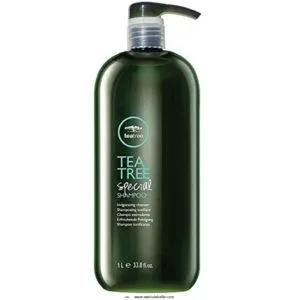
Ever tried a shampoo that’s like a spa for your scalp?
The Tea Tree Shampoo Deep Cleanse Oily Hair could be your ticket.
Known for its invigorating tea tree, peppermint, and lavender scent, it clears impurities while leaving your hair shiny and full of energy.
But be cautious—the tingly sensation mightn’t suit sensitive scalps, and it could dry your hair if used without a conditioner.
Many users rave about its effectiveness against dandruff, scalp acne, and post-workout grime.
Best For: This shampoo is best for those with oily hair, scalp issues like dandruff and acne, or those seeking a deep-cleanse experience.
- Deep cleanses and removes impurities.
- Invigorating tea tree, peppermint, and lavender scent.
- Effective for dandruff, scalp acne, and post-workout grime.
- Strong scent that might be overwhelming for some.
- Tingling sensation may be too intense for sensitive scalps.
- May cause dryness if not followed by conditioner.
2. Neutrogena T Sal Therapeutic Shampoo
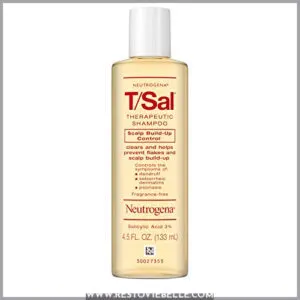
Searching for relief from scalp woes? Neutrogena T Sal Therapeutic Shampoo might just be your answer.
Packed with 3% salicylic acid, it tackles buildup like no other.
This unscented shampoo is recognized by dermatologists and starts showing results after the first wash, easing dry, itchy, and flaky scalps without added color or fragrance.
However, it may be too harsh for sensitive skin, so proceed with caution.
Although the bottle is small and pricey, it offers significant benefits for those in need.
Best For: This shampoo is ideal for those struggling with scalp psoriasis, seborrheic dermatitis, and dandruff.
- Clinically proven and dermatologist-recommended
- Clears scalp buildup after the first use
- Provides long-lasting relief from dryness, itchiness, and flakiness
- May be too harsh for sensitive skin
- Bottle is small and may be considered expensive
- May not be effective for all scalp conditions
3. OUAI Anti Dandruff Shampoo Soothing Scalp Care
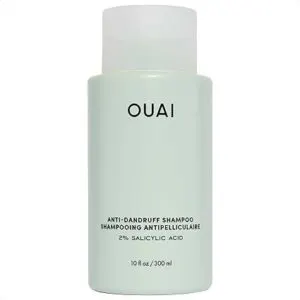
Let’s talk about the OUAI Anti Dandruff Shampoo Soothing Scalp Care, a top pick for managing folliculitis.
With salicylic acid battling flakes and propanediol caprylate soothing your scalp, it’s designed to reduce dandruff and itching.
Some users love its pleasant scent and sulfate-free formula, which is gentle on hair, even if colored.
However, it requires a five-minute wait during use, which some might find inconvenient.
While effective for many, it can be drying for some, so consider your hair type.
Best For: Those with itchy and flaky scalps looking for a gentle, sulfate-free shampoo.
- Effectively reduces dandruff and scalp itching.
- Leaves hair soft and manageable.
- Pleasant scent.
- May be drying for some hair types.
- Requires a 5-minute wait time.
- Can be pricey for some users.
4. OGX Tea Tree Mint Scalp Shampoo
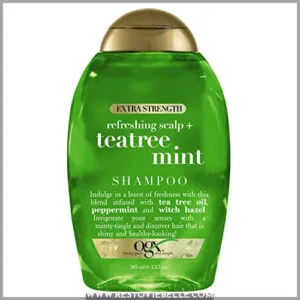
Packed with invigorating tea tree oil, peppermint extract, and witch hazel, OGX Tea Tree Mint Scalp Shampoo offers a revitalizing cleanse for oily hair types, with benefits similar to what you’d find in other Tea tree shampoos online.
It gently cleanses, similar to a best clarifying shampoo for locs, designed to remove buildup while keeping natural oils, it leaves your scalp feeling rejuvenated.
It’s sulfate and paraben-free, making it a gentle yet effective choice.
Although perfect for oily scalp folks, it can speed up color loss, so colored hair users beware.
For an invigorating experience, opt for the Extra Strength/Refreshing version—but watch out for recent contamination issues.
Best For: This shampoo is best for people with oily scalps who want a refreshing and invigorating cleanse.
- Effectively cleanses oily hair by utilizing natural ingredients like pine tar oil, which has antimicrobial and antifungal properties to relieve itchy scalp conditions. Effectively cleanses oily hair without stripping natural oils.
- Soothes and promotes a healthier scalp.
- Sulfate and paraben-free, making it a gentle yet effective choice.
- May speed up color loss in colored hair.
- Some users have reported contamination issues with recent shipments.
- The Extra Strength/Refreshing version can be too invigorating for some.
5. Jupiter Anti Dandruff Shampoo Vegan Sulfate Free
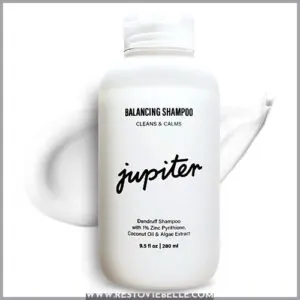
Jupiter Anti Dandruff Shampoo, known for its vegan and sulfate-free formula, is your go-to choice if folliculitis is a concern.
It’s loaded with ingredients like aloe vera, which can soothe scalp itchiness after bleaching. Zinc Pyrithione, an ingredient that combats dandruff and soothes an itchy scalp.
Imagine combining that with the moisturizing power of coconut oil and aloe vera, which can also be enhanced by using natural ingredients for hair.
While its thick consistency does mean using less, it may feel heavy for those with thin or oily hair.
Best For: Those with dry, itchy scalps and dandruff.
- Targets dandruff and scalp irritation
- Moisturizes hair
- Vegan and cruelty-free
- May leave hair feeling sticky or heavy
- May not be suitable for thin or oily hair
- Pricey
6. Dove DermaCare Scalp Anti Dandruff Shampoo
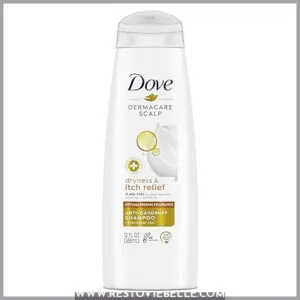
A popular choice, Dove DermaCare Scalp Anti-Dandruff Shampoo, tackles dandruff with pyrithione zinc.
Its gentle, pH-balanced formula is kind to your hair, leaving it flake-free and smoother.
However, some find it too moisturizing or experience breakage with frequent use.
Consider your hair type; it might be a perfect fit, or you might need something less rich.
The pleasant coconut and shea butter scent is a plus for many.
Remember, everyone’s scalp is unique, so what works for one person mightn’t work for another.
Always read reviews to see if it’s right for you.
Best For: Those with dry scalps and dandruff seeking a gentle, fragrant shampoo, as understanding the differences between dandruff vs dry scalp can help manage symptoms effectively. Those with dry scalps and dandruff seeking a gentle, fragrant shampoo.
- Effectively tackles dandruff with pyrithione zinc.
- Gentle, pH-balanced formula is kind to hair.
- Pleasant coconut and shea butter scent.
- May be too moisturizing for some hair types.
- Some users reported hair breakage with frequent use.
- Price may be considered overpriced by some customers.
7. Nizoral Anti Dandruff Shampoo Ketoconazole
Nizoral Anti Dandruff Shampoo puts you back in control of your scalp’s health by tackling the root cause of dandruff—fungus.
With 1% ketoconazole, it’s not just another shampoo; it’s clinical strength, ten times more effective than others.
Use it twice a week and experience significant itch and flake reduction after a few washes.
Safe for all hair types, it won’t dry out your scalp.
Although some report dryness, many swear by its ability to restore and rejuvenate their hair’s health.
Best For: People who struggle with dandruff and itching.
- Kills the fungus that causes dandruff.
- Clinically proven to be highly effective.
- Gentle on hair and scalp.
- Can cause dryness in some users.
- Only available in liquid form.
- Requires use only twice per week.
8. Clarifying Scalp Shampoo Salicylic Acid
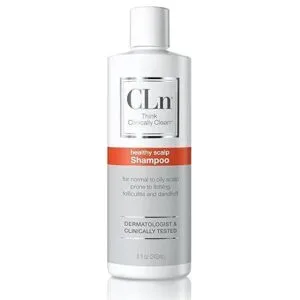
Imagine you’re tackling folliculitis head-on with a clarifying scalp shampoo that combines salicylic acid and sodium hypochlorite.
It’s like calling in a professional cleaner for your scalp, sweeping away dirt and oil without the mess.
Many people find significant relief from itching and bumps, though some do note a strong scent and low lather.
This shampoo isn’t the cheapest option, and it can linger longer than a dinner guest.
Always consider consulting a dermatologist to see if it’s the right fit for you.
Best For: Those experiencing scalp conditions like folliculitis, seborrheic dermatitis, or dandruff.
- Deeply cleanses and detoxifies the scalp.
- Can offer relief from itching and bumps.
- Hypoallergenic and safe for chemically treated hair.
- Strong, antiseptic smell that some find unpleasant.
- Doesn’t lather well.
- Can be expensive.
9. Fragrance Free Sensitive Skin Shampoo
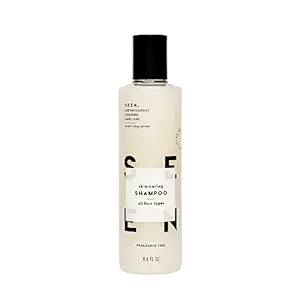
For those with sensitive scalps, a Fragrance Free Sensitive Skin Shampoo might be your new best friend.
Dermatologist-developed and vegan, this shampoo avoids harsh chemicals, making it sulfate-free and non-comedogenic.
It’s ideal for all skin and hair types, offering a luxurious lather without harmful additives like sulfates or parabens.
While some users report a chemical smell or increased dryness, its PETA approval and color-safe formula still make it a good option.
Though possibly pricey, it’s a worthy contender for managing folliculitis.
Best For: This shampoo is best for those with sensitive skin and scalps who are looking for a gentle, fragrance-free, and dermatologist-developed option.
- Sulfate-free and non-comedogenic, making it gentle on sensitive skin.
- Vegan and PETA-approved, making it a cruelty-free option.
- Color-safe and keratin-safe, making it suitable for all hair types.
- Some users reported a chemical smell, dryness, and dullness.
- Some users experienced hair loss or acne worsening.
- It can be expensive compared to other shampoos.
Managing Scalp Folliculitis With Shampoos
To manage scalp folliculitis effectively, use shampoos designed to combat bacterial or fungal infections, typically containing ingredients like tea tree oil or ketoconazole.
Scalp folliculitis is an inflammatory condition that affects hair follicles, and it can be caused by bacteria or fungi.
Make sure to follow up with a moisturizing conditioner to prevent your scalp from drying out and to reduce irritation.
Frequency of Use and Application
To effectively tackle folliculitis, consider shampoo frequency.
Use tea tree oil or ketoconazole shampoo a few times a week.
When washing, focus on gentle application technique and wash duration.
Massage the shampoo into your scalp for a couple of minutes, then rinse thoroughly.
This helps clear scalp issues and reduce irritation without over-washing.
Balancing treatment is key.
Follow-up With a Moisturizing Conditioner
A moisturizing conditioner is very important after treating folliculitis with shampoo.
It replenishes moisture, providing dryness relief and essential scalp hydration.
Select conditioners rich in soothing ingredients like aloe vera or shea butter for maximum conditioner benefits.
Product recommendations may include lightweight formulas that won’t clog pores, ensuring the perfect balance in your scalp care routine.
Give your hair the love it deserves!
Avoiding Irritation and Inflammation
Preventing scalp irritation is key to managing folliculitis.
Gentle handling of your hair is very important.
Here’s how:
- Use gentle products. Avoid harsh chemicals.
- Practice good scalp hygiene. Keep your scalp clean and dry.
- Be mindful of hair styling. Avoid tight hairstyles.
- Use a soft-bristled brush. Minimize friction.
Reducing inflammation means less itching and discomfort.
Stress management can also help.
Preventing Folliculitis and Maintaining a Healthy Scalp
You can maintain a healthy scalp and prevent folliculitis by keeping your scalp clean and dry and avoiding tight hairstyles that can cause irritation.
Tight hairstyles can cause irritation, so it’s best to avoid them.
Using a gentle hairbrush and minimizing friction will also help your scalp stay in excellent condition.
Keeping The Scalp Clean and Dry
Washing your hair regularly with an antifungal shampoo, such as a scalp treatment shampoo formulated for folliculitis care (Scalp treatment options), keeps folliculitis at bay and promotes scalp health.
Dry your scalp thoroughly after washing to prevent infections.
Avoiding damp hair reduces risks of scalp rash and encourages dry scalp care.
A consistent showering routine with the right products helps maintain ideal scalp hygiene, helping to dodge pesky flare-ups of folliculitis.
Avoiding Tight Hairstyles and Headwear
Though your favorite ponytail might seem harmless, it can lead to hair loss and scalp folliculitis.
Tension from tight hairstyles can cause damage to hair follicles, leading to scalp bumps and irritation.
Opt for looser styles to keep your scalp happy.
Avoiding tight hairstyles and headwear doesn’t mean sacrificing style.
Consider these tips:
- Switch to looser braids or buns
- Limit wear time for hats or helmets
- Let your hair down often
Using a Gentle Hairbrush and Minimizing Friction
Friction from tight hairstyles can irritate the scalp, leading to folliculitis.
Opt for a gentle hairbrush suited to your hair texture, reducing friction and promoting scalp health.
Think of it like untangling holiday lights—patience pays off!
Use detangling tips and practice a soothing scalp massage.
Pair with a gentle shampoo to nurture your scalp’s delicate ecosystem.
Frequently Asked Questions (FAQs)
What is the best shampoo for scalp folliculitis?
Imagine your scalp’s a battlefield against folliculitis.
You need a trusty ally like Nizoral Anti-Dandruff Shampoo.
Packed with ketoconazole, it fights fungal infections.
Tea Tree Special Shampoo with its natural oils also offers relief and protection.
What is the treatment for scalp folliculitis?
Treat scalp folliculitis with topical antibiotics or antifungal treatments like clindamycin lotion or ketoconazole shampoo.
Severe cases might need oral antibiotics.
Dandruff shampoos help manage symptoms.
Regular cleaning reduces bacteria or fungi, keeping your scalp happy.
What is folliculitis shampoo?
Think of folliculitis shampoo as a knight’s armor for your scalp, guarding against bacteria and fungi.
It’s specially formulated with ingredients like tea tree oil or ketoconazole to soothe irritation and prevent infection.
Choose wisely!
Why do dermatologists recommend folliculitis shampoo?
Dermatologists recommend folliculitis shampoo because it targets bacteria and fungi, easing symptoms like itching and redness.
Folliculitis shampoo can combine tea tree oil and salicylic acid together to create a powerful, acne-fighting formula that helps clear infections and prevent flare-ups by using ingredients like tea tree oil and salicylic acid.
What shampoo should I use if I have folliculitis?
When your scalp’s acting up, reach for shampoos with antifungal or antibacterial ingredients like tea tree oil or ketoconazole.
Popular picks include Nizoral Anti-Dandruff and Tea Tree Special Shampoo.
They help keep those pesky folliculitis bumps at bay.
How I cured my scalp folliculitis?
To cure your scalp folliculitis, use medicated shampoos with antifungal ingredients like ketoconazole.
Avoid irritating products and tight headwear.
For severe cases, consult a dermatologist for prescription treatments such as antibiotics or specific antimicrobials.
What do dermatologists recommend for folliculitis?
Imagine those pesky bumps vanishing! For folliculitis, dermatologists often suggest medicated shampoos, antibiotic creams, or even laser treatments. It’s all about tackling the root cause.
How do you get rid of folliculitis in your hair?
Start by washing your hair with an antifungal or antibacterial shampoo like Nizoral or tea tree oil shampoo.
Avoid tight hats, and let your hair breathe.
If it persists, consult a dermatologist for specific treatment options.
Does folliculitis shampoo treat all types?
Folliculitis shampoo doesn’t cure all types due to varied causes like bacteria, fungi, or viruses.
It mainly targets fungal or bacterial scalp folliculitis.
For severe issues, consult a dermatologist for customized treatments based on specific causes.
How long until I see results?
You’ll likely see improvements in folliculitis symptoms within two to four weeks when using the right shampoo or treatment.
Results vary based on the condition’s severity and underlying causes, so patience and consistency are key.
Can I use it daily?
Using shampoo daily for folliculitis isn’t usually recommended, as over-washing can irritate your scalp.
Stick to products with antifungal or antibacterial properties, like those with tea tree oil or ketoconazole, and follow label directions carefully.
Are there side effects?
There can be side effects like dryness, irritation, or an allergic reaction when using treatments for folliculitis.
If you notice redness or itching getting worse, stop using the product and consult a dermatologist for advice.
Which shampoo is best for me?
Think of your scalp as a garden needing care.
Try shampoos like CLn Healthy Scalp, Nizoral, or Tea Tree Special for folliculitis.
They’re packed with antifungal and antibacterial properties to give you relief and healthier hair.
Conclusion
Remember, finding the right best shampoo for folliculitis is key.
Did you know that up to 80% of adults experience some form of scalp irritation?
Experiment with different shampoos from our list to see what works best for you.
Gentle cleansing and regular use are important.
Don’t forget a moisturizing conditioner afterwards!
A healthy scalp routine, including the right shampoo, can greatly reduce outbreaks.
Addressing the root cause, whether it’s bacteria or irritation, is essential for long-term improvement.
Keep your scalp clean and happy!
